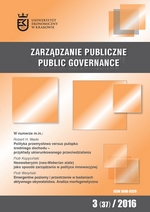Public policy in the neo-Weberian state
DOI:
https://doi.org/10.15678/ZP.2016.37.3.05Keywords:
neo-Weberian state, public management model, public policy cycle, New Public Management, public governanceAbstract
Assuming that it is possible and desirable to distinguish the phenomenon called “neo-Weberian state (NWS),
the paper attempts to define public policy cycle phases in a way that makes it feasible and useful to determine the existence of the neo-Weberian model of public policy creation in a country. The paper analyzes current attempts to define the notion of NWS and makes an effort to present constitutive features of NWS against the backdrop of bureaucratic management, new public management, and of public governance in the context of public policy process. The process in question is understood simply as consisting of four basic phases – public policy diagnosis, design, implementation, and evaluation. The paper is divided as follows. In the first part, the author offers a synthetic summary of the current state of knowledge about the NWS phenomenon and he points out that there are no studies linking it to the important concept of public policy cycle. The second part should be considered as the main fragment of the text and at the same time its added value. It is an attempt to emphasize the distinctive elements of the NWS
approach within the various stages of the public policy cycle. In the third part, examples are found in governance practices of European countries which can be considered as manifestations of the NWS approach in relation to the four stages of the public policy cycle. The paper also includes an introduction and a summary.



